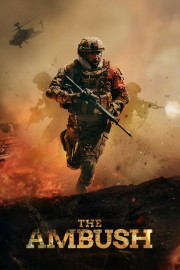The Ambush
War movies have come a long way from the days of the original “All Quiet on the Western Front” and “The Longest Day.” Now, they are capable of being about the moral ambiguity of war, questioning missions soldiers are sent on, and not sanitizing the bloodshed. Some are intended to be contemplative, like “Saving Private Ryan” or “1917,” while others are more focused on making it as viscerally exciting as possible. We don’t see too many that lean towards the latter without asking some of the contemplative questions, but that is where Pierre Morel’s “The Ambush” lands. It does have an emotional backbone, but ultimately, it’s about bringing American action formula to another country’s battles onscreen. If that’s something you’re interested in, you’ll like this film.
When most Americans think of Yemen, we think about how the Obama administration’s drone program, and our aide to Saudi Arabia, has resulted in countless civilian deaths in the name of fighting terrorism. That is left out of the context-setting titles at the beginning of “The Ambush,” mainly because it is not about the American involvement in Yemen, but that of the United Arab Eremites. In 2015, UAE forces were dispatched into the country to help the Yemeni government combat terrorists and other insurgent groups that threatened to destabilize the country. In February of 2018, we follow a team of UAE soldiers on patrol- the last one of their deployment- whom are ambushed by insurgents, and the efforts to bring them home safe.
From that description, you can tell that the screenplay by Brandon and Kurtis Birtell is borrowing heavily from Ridley Scott’s “Black Hawk Down,” and it makes sense, because that is a strong structure for war-time drama. Morel, however, is not Ridley Scott. The “Taken” director is certainly capable of staging action, but there’s not really a lot of room for the ambiguity of soldiers being in a land that is not theirs, fighting a war that is not theirs, that there was in Scott’s film. This is about pinning us to our seats with battle scenes, and hoping we care enough about the characters to follow them. We do not have a strong emotional connection with any of them the same way we do with, say, the main character in this year’s “Sniper: The White Raven”- another foreign war film this year that borrows from American action formula- but we become engaged with the situation as the film plays out over its 112-minutes. (Morel enlisting a great genre veteran like Harry Gregson-Williams to compose the score benefits the film greatly.) Part of that is because, as war movies have evolved over the decades, they’ve also been able to convey more honesty in terms of how they portray battle; because of that, even a narrative from a country that is not our own becomes a compelling human drama. “The Ambush” is not great war cinema, but it does bring us closer to the people fighting this war than we otherwise would have been.










